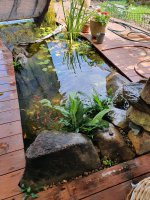Morning everyone,
I'm really hopeful someone can help. I have a approx. 2200lt pond with about 15 goldfish (started with 6 just 6 months ago). The pond was starting to look a bit murky so I did a big clean and water change yesterday. I probably did a 25% water change with rain water from our rainwater tank (no tap water) and vacuumed up a bit of sludge from the pebble bottom. I cleaned out the sponges in the filter, which were quite full of algae and I only used pond water for this.
The pond is looking good this morning but I've done a water test using Oase Quickstick test this morning and the Nitrite levels are high, Nitrate is OK. I've tested the rain water in the tank and the Nitrite levels in the rainwater tank are OK. These Quicksticks are not great and I need to get a better test kit but I've not seen the Nitrites this high before, not even when I was starting up the pond 6 months ago.
My fishy family (I know they are only goldfish) all seem to be OK at this point but I am concerned. Could the spike in Nitrites be because I stirred up the pond cleaning it yesterday?
The Ph is also only 6.8.

I'm really hopeful someone can help. I have a approx. 2200lt pond with about 15 goldfish (started with 6 just 6 months ago). The pond was starting to look a bit murky so I did a big clean and water change yesterday. I probably did a 25% water change with rain water from our rainwater tank (no tap water) and vacuumed up a bit of sludge from the pebble bottom. I cleaned out the sponges in the filter, which were quite full of algae and I only used pond water for this.
The pond is looking good this morning but I've done a water test using Oase Quickstick test this morning and the Nitrite levels are high, Nitrate is OK. I've tested the rain water in the tank and the Nitrite levels in the rainwater tank are OK. These Quicksticks are not great and I need to get a better test kit but I've not seen the Nitrites this high before, not even when I was starting up the pond 6 months ago.
My fishy family (I know they are only goldfish) all seem to be OK at this point but I am concerned. Could the spike in Nitrites be because I stirred up the pond cleaning it yesterday?
The Ph is also only 6.8.



